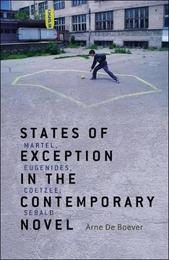
|
States of Exception in the Contemporary Novel: Martel, Eugenides, Coetzee, Sebald
Hardback
Main Details
| Title |
States of Exception in the Contemporary Novel: Martel, Eugenides, Coetzee, Sebald
|
| Authors and Contributors |
By (author) Dr. Arne De Boever
|
| Physical Properties |
| Format:Hardback | | Pages:176 | | Dimensions(mm): Height 216,Width 138 |
|
| Category/Genre | Literary studies - from c 1900 -
Literary studies - fiction, novelists and prose writers |
|---|
| ISBN/Barcode |
9781441125972
|
| Classifications | Dewey:809.05 |
|---|
| Audience | | Professional & Vocational | |
|---|
|
Publishing Details |
| Publisher |
Continuum Publishing Corporation
|
| Imprint |
Continuum Publishing Corporation
|
| Publication Date |
8 March 2012 |
| Publication Country |
United States
|
Description
In the aftermath of the September 11 terror attacks, the political situation in both the United States and abroad has often been described as a "state of exception": an emergency situation in which the normal rule of law is suspended. In such a situation, the need for good decisions is felt ever more strongly. This book investigates the aesthetics, ethics, and politics of various decisions represented in novels published around 9/11: Martel's Life of Pi, Eugenides' Middlesex, Coetzee's Disgrace, and Sebald's Austerlitz. De Boever's readings of the novels revolve around what he calls the 'aesthetic decision.' Which aesthetics do the characters and narrators in the novels adopt in a situation of crisis? How do these aesthetic decisions relate to the ethical and political decisions represented in the novels? What can they reveal about real-life ethical and political decisions? This book uncovers the politics of allegory, autobiography, focalization, and montage in today's planetary state of exception.
Author Biography
Arne De Boever is Assistant Professor of American Studies and Director of the MA Program in Aesthetics and Politics in the School of Critical Studies, California Institute of the Arts, USA.
Reviews"Arne De Boever offers a strikingly consistent and nuanced analysis of four important contemporary novels. His interdisciplinary theoretical approach, which combines present-day political theory with in-depth literary criticism, generates innovative insights. This highly readable book provides convincing and often fascinating interpretations that will be of value to students and scholars of literature as well as critical/political theory." -- Hilde Staels, Associate Professor of English Literature / Literary Theory, University of Leuven, Belgium "One of the most inventive readers of fiction now writing, Arne De Boever discovers in the contemporary novel's dealings with trauma-that which seems too big for ethics-just what the post-9/11 world has been looking for: a wisdom literature that teaches decision-making under conditions of undecidability, when the ordinary ethical rules do not apply. The phrase 'state of exception' has been much used of late, but De Boever's treatment manages to be itself a beautiful exception." -Bruce Robbins, Old Dominion Foundation Professor in the Humanities, Columbia University "With the theoretically informed study of literature being forced more and more in to the margins of literary studies, Arne De Boever's book stands out for its commitment to a rigorous, nuanced and convincing theoretical methodology for interrogating the complex relationships between the aesthetic and political in contemporary literature and culture. The readings of these texts - all focused around the ethics of the aesthetic 'decision' - work to unpick some of our most common assumptions about the political form of the novel in the twenty-first century, making it both essential and challenging reading." -Alex Murray, Lecturer in English, University of Exeter, UK Arne De Boever's States of Exception in the Contemporary Novel offers a unique approach [...], looking to contemporary fiction for a radical rethinking of the forms of ethical and political decision making. [...] States of Exception in the Contemporary Novel is a valuable step toward better understanding the novel's recent history. At the same time, it indicates our need for a more thoroughgoing analysis of the constitutive differences between political, ethical, and aesthetic decisions, so that we might better see how those spheres inform and illuminate one another. -- David Babcock, James Madison University, USA * Novel, Volume 47, Number 2, Summer 2014 *
|